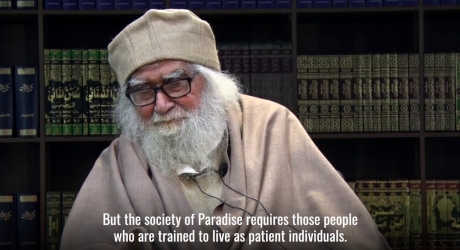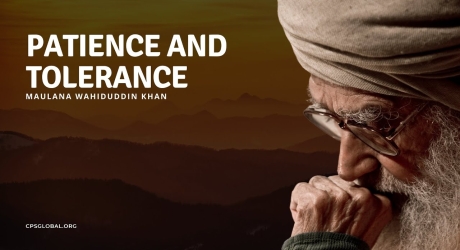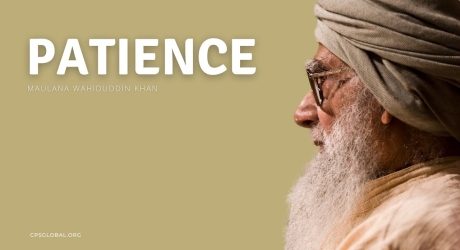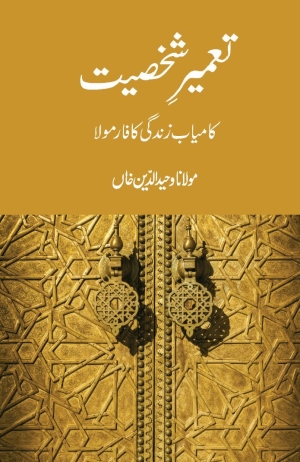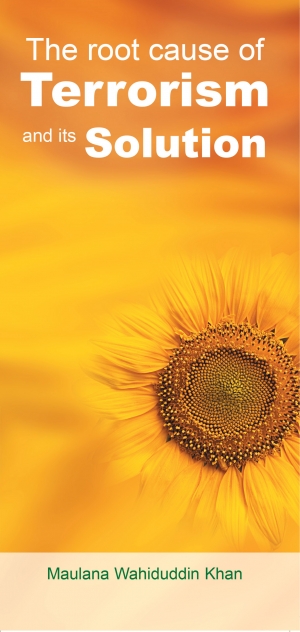Sabr or Patience is to exercise restraint. Patience is a great virtue without which a person’s aim to lead his life in this world with high ideals can seldom be achieved. The reality is that at every step an individual is faced with experiences so unpleasant and so provoking that they divert him from his true purpose in life – to the point of making him lose sight of his ideals.
This being so, if he allows himself to be provoked at every turn and becomes embroiled in every unpleasant issue, he will cease to be able to surmount the hurdles in his onward journey. He will just keep frittering away his time and energy on irrelevant matters.
The sole solution to this problem is the exercise of patience. Patience is that prolonged self-control that enables the individual to tread the path of restraint when he has bitter experiences, instead of allowing himself to be provoked into vengeful or retaliatory behaviour. It makes it easier for him to face life’s vicissitudes with equanimity and forge ahead on the path of truth.
Patience, being a practical solution to the problems faced in the outside world are also a means of positive character building. One who fails to exercise patience gives free rein to negative thoughts and feelings and develops a likewise negative personality, while one who remains patient is so morally bolstered by his positive thoughts and feelings that he develops a positive personality.
Sabr is no retreat. Sabr only amounts to taking the initiative along the path of wisdom and reason instead of the path of emotions. Sabr gives one the strength to restrain one’s emotions in delicate situations and instead use one’s brain to find a course of action along result-oriented lines.
Success in the present world is destined only for those who adopt the path of patience in adverse circumstances.
Featured Articles
Featured Videos
FAQs
In the light of the Quran, my answer is, “Adopt the method of patience, and then, with God’s blessings, you will be successful in this world, and in the Hereafter, too.”
The fact is that there is a permanent divine guide within man. And that is man’s conscience. The human conscience is an unerring guide. It always guides man in the direction of the right path. But in addition to this, man has various types of desires. In the Quran, the conscience is called nafs al-lawwama and desires are called nafs alammara. Man’s conscience gives him, at every moment and opportunity, the right guidance. But along with this, man’s desires seek to drag him in their direction. In this way, a conflict emerges between man’s conscience and man’s desires. In this conflict, often desires overpower the conscience, and man, ignoring the voice of his conscience, runs after his desires. This happens both in the case of worldly affairs as well as the affairs of the Hereafter.
In such a delicate situation, it is patience that proves of benefit to man. If you are able to be patient, you can control your desires. In this way, you will not deviate from the Straight Path. Following your conscience, you will be able to carry on journeying in the right direction till you arrive at your destination. That is why the Quran (39: 10) says “Truly, those who persevere patiently will be requited without measure.” In practical terms, in life, the importance of a passive attribute is more than that of an active attribute. Someone who knows only to act but not to stop can never obtain any higher level of success in life. Life is like a car. If a car does not have a brake, then, no matter how otherwise good the car is, it cannot reach its destination. The importance of patience in life is like the importance of a brake in a car.
Source: Spirit of Islam May 2017
Patience is a great virtue without which a person’s aim to lead his life in this world with high ideals can seldom be achieved. The reality is that at every step an individual is faced with experiences so unpleasant and so provoking that they divert him from his true purpose in life—to the point of making him lose sight of his ideals.
This being so, if he allows himself to be provoked at every turn and becomes embroiled in every unpleasant issue, he will cease to be able to surmount the hurdles in his onward journey. He will just keep frittering away his time and energy in irrelevant matters.
The sole solution to this problem is the exercise of patience. Patience is that prolonged self-control that enables the individual to tread the path of restraint when he has bitter experiences, instead of allowing himself to be provoked into vengeful or retaliatory behaviour. It makes it easier for him to face life’s vicissitudes with equanimity and forge ahead on the path of truth.
It should be emphasized that patience means neither retreat nor capitulation. It means rather curbing turbulent emotions in order to follow a course marked by sanity and wisdom. Being patient and using one’s brain makes it easier to determine which is the most beneficial course of action to follow.
Those without patience fall a prey to negative influences, while those are patient develop positive personalities. The exercise of patience, on the one hand, is a solution to the problems faced by the individual. On the other hand, it is a major aid in the building of a superior personality. And it is such a personality that will become deserving of Paradise.
Source: The Spirit of Islam
Patience is the focus of about two hundred verses of the Quran, and referred to indirectly in many others, may be termed the core subject of the scriptures. The verses directly relating to patience are quite explicit in their content. For instance,
“And seek (God’s) help with patience and prayer.” (2: 45)
“And endure patiently whatever may befall you.” (31: 17)
“And exhort one another to be patient.” (103: 3)
“Ignore their hurtful talk. Put your trust in God.” (33: 48)
A very pronounced and direct instruction to behave with patience and endurance is apparent in these verses.
The majority of the other verses are also intensely concerned with patience. The very first verse of the Quran begins with “Praise belongs to God.” (Al-Fatihah) This shows that God expects mankind to express gratitude and admiration to Him. But this is a very trying expectation! We know that this world is full of unpleasant experiences and nobody can be insulated from them. According to the Quran “Man is born in toil.” Indeed, it is not possible for anyone to create a life of absolute bliss for himself.
How then a person can become grateful and appreciative of God’s grace in the real sense? The only way to be so is through patience. It is only when a man patiently endures worldly problems that it is possible for him to express his feeling of gratefulness to God. It is for this reason that the Quran associates gratefulness with patience.
Patience makes a person capable of finding a positive and successful solution to any problem. When someone explodes with anger while facing his adversary, he loses the faculty to respond effectively or to think of well-planned action. But when he applies patience and tolerance, he finds himself competent to make a rational move instead of an impulsive reaction. History testifies that one who acts on impulses and emotional reactions invariably fails; and one who responds rationally always succeeds. Patience is undoubtedly the superior solution to all problems.
Source: Spirit of Islam July 2016
Patience is the exercise of restraint in trying situations. It is a virtue which enables the individual to proceed towards worthy goals, undeflected by adverse circumstances or repeated provocations. If he allows himself to become upset by opposition, taunts, or other kinds of unpleasantness, he will never reach his goals. He will simply become enmeshed in irrelevancies.
The only way to deal with the irksome side of daily living is to exercise patience. Patience will ensure that whenever one has some bitter experience, he will opt for the way of tolerance rather than of reaction to provocation. It will enable one to absorb shocks and to continue, undeterred, on one’s onward journey.
Patience, as well as being a practical solution to the problems faced in the outside world, is also a means of positive character building. One who fails to exercise patience gives free rein to negative thoughts and feelings and develops a personality that is likewise negative while one who remains patient is so morally bolstered by his own positive thoughts and feelings that he develops a positive personality. It is only a positive and purified personality that will be found deserving of entry into Paradise in the Hereafter.
Source: Simple Wisdom



